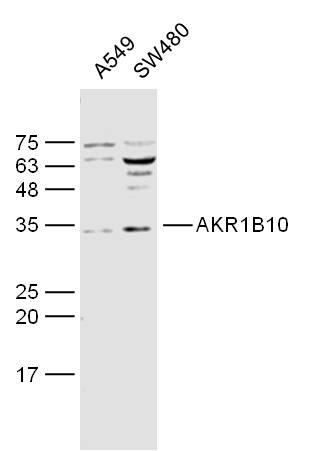AKR1B10 Rabbit pAb
AKR1B10 Rabbit pAb
- 产品详情
- 实验流程
- 背景知识
Application
| WB |
|---|---|
| Primary Accession | O60218 |
| Reactivity | Human |
| Predicted | Mouse, Rat, Rabbit |
| Host | Rabbit |
| Clonality | Polyclonal |
| Calculated MW | 36020 Da |
| Physical State | Liquid |
| Immunogen | KLH conjugated synthetic peptide derived from human AKR1B10 |
| Epitope Specificity | 8-110/316 |
| Isotype | IgG |
| Purity | affinity purified by Protein A |
| Buffer | 0.01M TBS (pH7.4) with 1% BSA, 0.02% Proclin300 and 50% Glycerol. |
| SUBCELLULAR LOCATION | Lysosome. Secreted. Note=Secreted through a lysosome-mediated non-classical pathway. |
| SIMILARITY | Belongs to the aldo/keto reductase family. |
| Important Note | This product as supplied is intended for research use only, not for use in human, therapeutic or diagnostic applications. |
| Background Descriptions | AKR1B10 is also known as aldose reductase-like-1 (ARL-1), small intestine reductase (SI reductase) or aldose reductase-related protein (ARP or hARP). AKR1B10 is found in many tissues but is predominantly expressed in small intestine, colon and adrenal gland. AKR1B10 is an efficient reductase for aliphatic and aromatic aldehydes. It plays a role in steroid metabolism as well as detoxification of aldehydes in digested food, and may be involved in the retinal-retinoic acid signaling pathway. AKR1B10 is prominently overexpressed in non-small cell lung carcinoma and adenocarcinoma. Cigarette smoking is an independent variable responsible for this overexpression. AKR1B10 may play a role regulating cell proliferation and cellular response to carbonyl stress. |
| Gene ID | 57016 |
|---|---|
| Other Names | Aldo-keto reductase family 1 member B10, 1.1.1.300, 1.1.1.54, ARL-1, Aldose reductase-like, Aldose reductase-related protein, ARP, hARP, Small intestine reductase, SI reductase, AKR1B10, AKR1B11 |
| Target/Specificity | Found in many tissues. Highly expressed in small intestine, colon and adrenal gland. |
| Dilution | WB=1:500-2000 |
| Storage | Store at -20 °C for one year. Avoid repeated freeze/thaw cycles. When reconstituted in sterile pH 7.4 0.01M PBS or diluent of antibody the antibody is stable for at least two weeks at 2-4 °C. |
| Name | AKR1B10 |
|---|---|
| Synonyms | AKR1B11 |
| Function | Catalyzes the NADPH-dependent reduction of a wide variety of carbonyl-containing compounds to their corresponding alcohols (PubMed:12732097, PubMed:18087047, PubMed:19013440, PubMed:19563777, PubMed:9565553). Displays strong enzymatic activity toward all-trans- retinal, 9-cis-retinal, and 13-cis-retinal (PubMed:12732097, PubMed:18087047). Plays a critical role in detoxifying dietary and lipid-derived unsaturated carbonyls, such as crotonaldehyde, 4- hydroxynonenal, trans-2-hexenal, trans-2,4-hexadienal and their glutathione-conjugates carbonyls (GS-carbonyls) (PubMed:19013440, PubMed:19563777). Displays no reductase activity towards glucose (PubMed:12732097). |
| Cellular Location | Lysosome. Secreted. Note=Secreted through a lysosome- mediated non-classical pathway |
| Tissue Location | Found in many tissues. Highly expressed in small intestine, colon and adrenal gland. |
For Research Use Only. Not For Use In Diagnostic Procedures.
Provided below are standard protocols that you may find useful for product applications.
BACKGROUND
AKR1B10 is also known as aldose reductase-like-1 (ARL-1), small intestine reductase (SI reductase) or aldose reductase-related protein (ARP or hARP). AKR1B10 is found in many tissues but is predominantly expressed in small intestine, colon and adrenal gland. AKR1B10 is an efficient reductase for aliphatic and aromatic aldehydes. It plays a role in steroid metabolism as well as detoxification of aldehydes in digested food, and may be involved in the retinal-retinoic acid signaling pathway. AKR1B10 is prominently overexpressed in non-small cell lung carcinoma and adenocarcinoma. Cigarette smoking is an independent variable responsible for this overexpression. AKR1B10 may play a role regulating cell proliferation and cellular response to carbonyl stress.
终于等到您。ABCEPTA(百远生物)抗体产品。
点击下方“我要评价 ”按钮提交您的反馈信息,您的反馈和评价是我们最宝贵的财富之一,
我们将在1-3个工作日内处理您的反馈信息。
如有疑问,联系:0512-88856768 tech-china@abcepta.com.























 癌症的基本特征包括细胞增殖、血管生成、迁移、凋亡逃避机制和细胞永生等。找到癌症发生过程中这些通路的关键标记物和对应的抗体用于检测至关重要。
癌症的基本特征包括细胞增殖、血管生成、迁移、凋亡逃避机制和细胞永生等。找到癌症发生过程中这些通路的关键标记物和对应的抗体用于检测至关重要。 为您推荐一个泛素化位点预测神器——泛素化分析工具,可以为您的蛋白的泛素化位点作出预测和评分。
为您推荐一个泛素化位点预测神器——泛素化分析工具,可以为您的蛋白的泛素化位点作出预测和评分。 细胞自噬受体图形绘图工具为你的蛋白的细胞受体结合位点作出预测和评分,识别结合到自噬通路中的蛋白是非常重要的,便于让我们理解自噬在正常生理、病理过程中的作用,如发育、细胞分化、神经退化性疾病、压力条件下、感染和癌症。
细胞自噬受体图形绘图工具为你的蛋白的细胞受体结合位点作出预测和评分,识别结合到自噬通路中的蛋白是非常重要的,便于让我们理解自噬在正常生理、病理过程中的作用,如发育、细胞分化、神经退化性疾病、压力条件下、感染和癌症。






